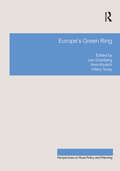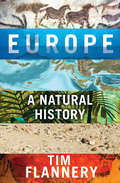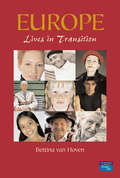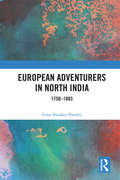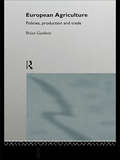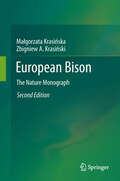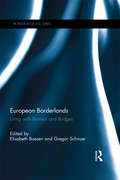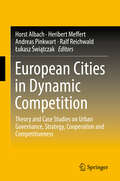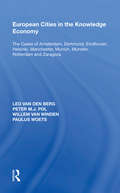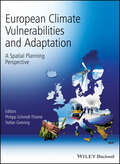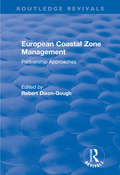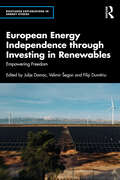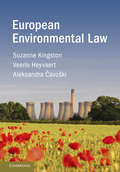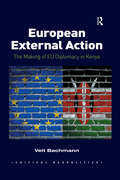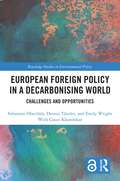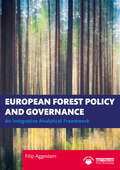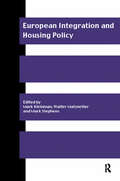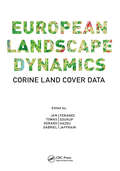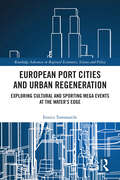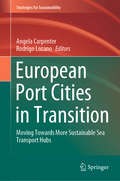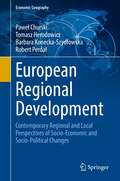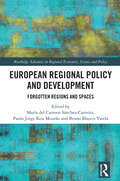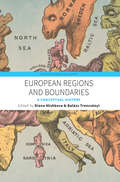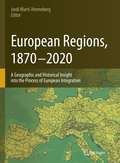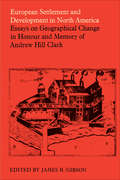- Table View
- List View
Europe's Green Ring (Perspectives on Rural Policy and Planning)
by Leo Granberg Imre KováchAround the fringe of Europe lies a green ring of countries which have followed different pathways into modernity from the industrial core of the continent and have, until recently, been characterized by a strong agrarian presence in their politics, economy and culture. This book brings together case studies from both the post-socialist countries and EU member states which make up the green ring to compare experiences of rural and agricultural groups. It provides a fascinating opportunity to identify similarities and contrasts in the ways in which these countries have managed their rural areas when faced with the challenges set by industrialization, political integration and globalization. The book focuses on agrarian transformation as de- (and sometimes re- ) peasantization - referring to the changing economic, social, cultural and political positions of farmers and food production workers. It also problematizes the standard rural models and opens up discussion of the problems these models pose for the farmers of the green ring countries.
Europe: A Natural History
by Tim FlanneryA tale of cave bears and comet strikes and a hundred million years of history by the bestselling author of Here on Earth: &“Marvelous.&”—Publishers Weekly (starred review) In Europe: A Natural History, world-renowned scientist, explorer, and conservationist Tim Flannery applies the eloquent interdisciplinary approach he used in his ecological histories of Australia and North America to the story of Europe. He begins 100 million years ago, when the continents of Asia, North America, and Africa interacted to create an island archipelago that would later become the Europe we know today. It was on these ancient tropical lands that the first distinctly European organisms evolved. Flannery teaches us about Europe&’s midwife toad, which has endured since the continent&’s beginning, while elephants, crocodiles, and giant sharks have come and gone. He explores the monumental changes wrought by the devastating comet strike and shows how rapid atmospheric shifts transformed the European archipelago into a single landmass during the Eocene. As the story moves through millions of years of evolutionary history, Flannery eventually turns to our own species, describing the immense impact humans had on the continent&’s flora and fauna—within 30,000 years of our arrival in Europe, the woolly rhino, the cave bear, and the giant elk, among others, would disappear completely. The story continues right up to the present, as Flannery describes Europe&’s leading role in wildlife restoration, and then looks ahead to ponder the continent&’s future: with advancements in gene editing technology, European scientists are working to recreate some of the continent&’s lost creatures, such as the great ox of Europe&’s primeval forests and even the woolly mammoth.
Europe: Lives in Transition
by Tim Unwin Bettina Van HovenFirst published in 2003. Routledge is an imprint of Taylor & Francis, an informa company.
European Adventurers in North India: 1750–1803
by Uma Shanker PandeyThis book explores how European, particularly French, adventurers shaped early modern India. It highlights the significant contributions of these adventurers in social, political, economic, and intellectual life of north India in the 18th and the 19th centuries. The author examines how the French adventurers played a key role in bringing Western science and ideas to a polity in flux. He examines the role of individuals like René Madec, Sombre, De Boigne, Perron, Gentil, Canaple, Delamarr, Sonson, and Pedrose, who made instrumental contributions in modernising armies of pre-modern states in South Asia. The volume also underlines how French adventurers’ commercial networks developing from their enterprises opened up markets in the heartlands of north India for European consumers. Further, it brings to the fore intellectual pursuits of the leading French figures such as Anquetil Duperron, Polier, Gentil, De Boigne, and Perron, whose engagement with Indian literature opened a new chapter framing studies of the Occident. Rich in French, English, and translated Persian archival resources, this book will be of interest to scholars and researchers of colonial history, early modern history, military history, and South Asian studies.
European Agriculture: Policies, Production and Trade
by Brian GardnerThe Common Agricultural Policy (CAP) is central to both economic and environmental developments in Europe. But with the advent of new environmental legislation and political change in Europe the CAP faces increasing pressure to reform. European Agriculture provides a comprehensive breakdown of the workings of the CAP and its impact on farming in Europe. The author discusses every aspect of European agricultural policy, production and trade, from environmental contraints and the impact of biotechnology, to the role of European farming in the world food supply system. Posing direct questions about the recent 1992 agricultural reform, the 1994 GATT agreement and the reasons for the expensive continuation of the CAP, European Agriculture analyses the economic, political and environmental implications of pursuing present farming policy and provides a provocative commentary on the agricultural future of Europe.
European Bison
by Małgorzata Krasińska Zbigniew A. KrasińskiThe mighty and majestic European bison is the relictual embodiment of the wildness of prehistoric Europe. Tragically, the millennia since that time have seen so many species driven to extinction by human impacts, and the European bison has only narrowly avoided the same fate. Today, the species represents the symbolic sentinel of successful conservation actions in a world in which such achievements remain few and far between. From an early stage in the restitution of the European bison, husband-and-wife team Małgorzata Krasińska and Zbigniew A. Krasiński have been participating in relevant management initiatives and researching all facets of the bison, from its morphology and diet, to its movements, social life and reproduction, and the conservation management actions that have been taken to save it. Now they have summarised this wealth of knowledge on the species, giving rise to a publication ideal for students, professional biologists and conservationists, but also for all nature enthusiasts. This new edition of the monograph offers extensively updated content taking into account research carried out on the European bison in the last few years. Also featured, a new chapter devoted to knowledge of the genetics of the species drawn up by Małgorzata Tokarska of the Białowieża-based Mammal Research Institute PAS.
European Borderlands: Living with Barriers and Bridges (Border Regions Series)
by Edited by Elisabeth Boesen and Gregor schnuerThe expectations of European planners for the gradual disappearance of national borders, and the corresponding prognoses of social scientists, have turned out to be over-optimistic. Borders have not disappeared – not even in a unified and predominantly peaceful Europe – but rather they have changed, become more varied and, in a certain sense, mobile, taking on an important role in the everyday lives of more people than ever before. Furthermore, it is now widely accepted that borders do not just hinder communication and the formation of relationships, but also channel and prefigure them in a positive way. Presenting a number of studies of everyday life in European borderlands, this book addresses the multifarious and complex ways in which borders function as both barriers and bridges. Focusing on ‘established’ Western European borderlands – with the exception of three contrasting cases – the book attempts a turn from conflict to harmony in the study of borderlands and thus examines the more mundane manifestations of border life and the complex, often unconscious motives of everyday cross-border practices. The collection of chapters demonstrates that even in the case of ‘open’ political borders, the border remains an enduring factor that is not adequately described as either a problematic barrier or a desirable bridge. The studies look at bordering processes, not only approaching them from different disciplinary angles – sociology, anthropology, geography, history, political science and literary studies – but also choosing different scales and making comparisons that range from different borders of one country to the reactions and attitudes of different individuals in a single borderland village.
European Cities in Dynamic Competition: Theory and Case Studies on Urban Governance, Strategy, Cooperation and Competitiveness
by Horst Albach Heribert Meffert Andreas Pinkwart Ralf Reichwald Łukasz ŚwiątczakWorld population and the number of city dwellers are steadily growing. Globalization and digitalization lead to an increased competition for skilled and creative labor and other economic resources. This is true not only for firms, but increasingly also for cities. The book elaborates on resulting challenges and opportunities for urban management from the European perspective, and discusses theories, methods and tools from business economics to cope with them. Contributions in this volume come from scholars and practitioners of economics, business administration and urban management, and cover aspects ranging from urban dynamics to city marketing. They draw on experiences from several European cities and regions, and discuss strategies to improve city performance including Open Government, Smart City, cooperation and innovation. The book project was initiated and carried out by the Center for Advanced Studies in Management (CASiM), the interdisciplinary research center of HHL Leipzig Graduate School of Management. It is addressed to scholars and managers in Europe and beyond, who will benefit from the scientific rigor and useful practical insights of the book.
European Cities in the Knowledge Economy: The Cases of Amsterdam, Dortmund, Eindhoven, Helsinki, Manchester, Munich, M�nster, Rotterdam and Zaragoza (Euricur Series (european Institute For Comparative Urban Research) Ser.)
by Leo van BergAcross Western Europe, the emphasis has shifted from physical manufacturing to the development of ideas, new products and creative processes. This has become known as the knowledge economy. While much has been written about this concept, so far there has been little focus on the role of the city. Bringing together comparative case studies from Amsterdam, Dortmund, Eindhoven, Helsinki, Manchester, Munich, Münster, Rotterdam and Zaragoza, this volume examines the cities' roles, as well as how the knowledge economy affects urban management and policies. In doing so, it demonstrates that the knowledge economy is a trend that affects every city, but in different ways depending on the specific local situation. It describes a number of policy options that can be applied to improve cities' positions in this new environment.
European Climate Vulnerabilities and Adaptation
by Philipp Schmidt-Thome Stefan GreivingEuropean Climate Vulnerabilities and Adaptation: A Spatial Planning Perspective analyses the impacts climate change might have on regions and their local economies. Regions clearly differ in view of the complex patterns of climate change impact, but also regarding the given vulnerability and coping capacity.Impacts of climate change can have a marked effect on the functioning of regions and sectors of the society, if not properly addressed. Readiness to adapt to the impacts and lasting changes counts towards vulnerability of the regions.The book builds upon the findings of a project conducted under the European observation network for territorial development and cohesion (ESPON), The ESPON Climate project. Following the stipulations of the ESPON programme and the tender for this project the territorial focus is the raison d'être and methodological core of the project as a whole and its various research actions: The outcomes of each action will be focused on what impacts global climate change will have for the different European regions and how the regions can cope with the projected impacts in order to become less vulnerable to climate change.This book: Provides a comprehensive analysis of climate change impacts on 29 European regions and their local economiesTakes an interdisciplinary approach dealing with the physical, social, economic, environmental, cultural and institutional aspects of climate change vulnerability and the consequences for spatial planningBuilds on the findings of the ESPON Climate project with a policy focused approachIs in full colour throughout with a broad range of case studies
European Coastal Zone Management: Partnership Approaches (Routledge Revivals)
by Robert W. Dixon-GoughThis title was first published in 2001. Management of coastal zone areas is particularly complicated due to their international nature. Focussing on European coastal zones, this volume examines the various key issues and concerns and highlights the importance of partnership approaches. It details the inter-relationship between the various organizations involved (both governmental and none-governmental), as well as appraising the current national and international legislation and possible future policies. The contributors draw on in-depth case studies from the UK, the Baltic and Hellenic coasts and discuss topics such as international conflicts within the coastal zone, the effectiveness of planning legislation and how to appraise environmental and cultural impacts of changes in coastal zone land use.
European Energy Independence through Investing in Renewables: Empowering Freedom (Routledge Explorations in Energy Studies)
by Julije Domac Velimir Šegon Filip DumitriuThis book delves into Europe’s urgent quest for energy independence as a foundation for the EU and national sovereignty, economic resilience and climate leadership. Amid the rising geopolitical tensions and accelerating climate crises, it advocates for a bold shift towards renewable energy investments as a pathway to a sustainable, energy-secure future.Offering an in-depth exploration of policy innovations, strategic imperatives and case studies, the book highlights how decentralized energy systems and local empowerment can drive resilience and self-reliance. It underscores Europe’s potential to lead the global renewable energy transition, serving as a blueprint for other regions tackling energy insecurity and climate change. The book demonstrates how the EU and its nations can simultaneously enhance energy security and achieve their climate goals through strategic investment in renewables.The book is designed for policymakers, academics and energy professionals, particularly those involved in European energy, climate and economic strategies. It is also an essential resource for university professors and researchers in energy policy, international relations, sustainability and European studies. Regional and local leaders will find valuable insights on implementing transformative energy solutions tailored to their communities.
European Environmental Law (Routledge Research In European Union Law Ser.)
by Suzanne Kingston Veerle Heyvaert Aleksandra ČavoškiEU Environmental Law is a critical, comprehensive and engaging account of the essential and emerging issues in European environmental law and regulation today. Suitable for advanced undergraduate and postgraduate students, the book delivers a thematic and contextual treatment of the subject for those taking courses in environmental law, environmental studies, regulation and public policy, and government and international relations. Placing the key issues in context, EU Environmental Law takes an interdisciplinary and thematic approach to help students to better understand the implementation and enforcement of environmental law and policy across Europe. It offers an accessible overview, and links theory with practical applications that will allow students to contextualise the outcomes of legal rules and their impact on public and private behaviours. It provides a definitive account of the subject, examining traditional topics such as nature conservation law, waste law and water law, alongside increasingly important fields such as the law of climate change, environmental human rights law, and regulation of GMOs and nanotechnology.
European External Action: The Making of EU Diplomacy in Kenya (Critical Geopolitics)
by Veit BachmannEuropean External Action provides a critical assessment of the practice of EU diplomacy in a key site of Africa-European relations and the global development industry - the Kenyan capital of Nairobi. It analyses how the EU positions itself through its newly established diplomatic corps, the European External Action Service (EEAS), and how it is perceived as a collective geopolitical actor by its external cooperation partners. Going beyond existing studies on EU policy making in Brussels and African-European relations more generally, this book explores in a novel way the conduct of external relations and perceptions of the EU - abroad. Based on institutional ethnography within the EU Delegation in Nairobi and research affiliation with the University of Nairobi, as well as interviews with leading individuals of Kenyan-European interaction, it analyses the practices, processes and perceptions through which EU diplomacy is enacted and realised in a strategic node of global North-South relations. In light of the EU’s claim as a key partner for developing countries and its ambition to be a major player in global politics, European External Action thereby speaks not only to wider debates on the EU’s role as a global and development actor, but also provides new insights in the internal dynamics and the making of external agency in and through EU diplomacy.
European Foreign Policy in a Decarbonising World: Challenges and Opportunities (Routledge Studies in Environmental Policy)
by Sebastian Oberthür Gauri Khandekar Dennis Tänzler Emily WrightContributing to the emerging literature on the geopolitical and foreign policy implications of decarbonisation and energy transition processes, this book sheds light on the future of the European Union’s external relations under decarbonisation. Under the Paris Agreement on climate change, adopted in 2015, governments committed to phasing out the emissions of carbon dioxide and other greenhouse gases over the coming decades. This book addresses the many questions around this process of decarbonisation through detailed analyses of EU external relations with six fossil-fuel exporting countries: Nigeria, Indonesia, Azerbaijan, Colombia, Qatar and Canada. The authors systematically examine the six countries’ varying dependence on fossil fuels, the broader political and security context, current relations with the EU and the potential for developing these toward decarbonisation. In doing so, they put forward a series of findings that should hold across varying circumstances and provide a steppingstone to enrich and inspire further research on foreign policy, external relations and international relations under decarbonisation. The book also makes an important contribution to understanding the external implications of the 2019 European Green Deal. This volume will be of great interest to students and scholars of European environmental and climate policy, climate diplomacy, energy policy, foreign policy and climate/energy geopolitics.
European Forest Policy and Governance: An Integrative Analytical Framework
by Filip AggestamThis book provides a state-of-the-art overview covering distinct and relevant aspects of forest policy processes in Europe, presenting a fresh perspective on different analytical approaches, theories, and frameworks.Set against the background of a changing world, driven by significant social, environmental, and economic developments, in Europe and elsewhere, there is a growing need for an improved understanding of forest governance and how to analyse the forest policymaking processes. This book introduces the reader to some of the key issues typically encountered in reviewing proposed as well as established forest policies, focusing on five socially relevant topics for the forest-based sector today, namely: European forest governance under a green new deal Systemic changes and the circular (bio-)economy Social changes connected with forest ownership and forest actors Nature conservation and the pursuit of multifunctional forests Living with forest fires and climate change. In so doing, this book presents a set of timely and rich case studies relevant to the study of forest governance. In the final chapter, it puts forward an innovative and systematic method for selecting the most appropriate analytical tool that accounts for the constraints and objectives involved in monitoring forest policy. The book is accompanied by chapter-level exercises and online Support Material which details the various approaches, theories, and frameworks discussed in the book, providing direct links back to individual chapters, discussion points, and a step-by-step guide for how each method can be applied.This book will be an essential read for forestry students and scholars, and professionals and policymakers working on forest policy and forest management.
European Integration and Housing Policy (Routledge/rics Issues In Real Estate And Housing Ser.)
by Mark Stephens Mark Kleinman Walter MatznetterThis book presents a series of debates arising from the housing needs of different EU countries. The authors address key issues by examining in turn: * the consequences of European integration for different housing markets * the impact of the Maastricht Treaty and other policy documents * the social consequences of integration including income distribution, homelessness and marginal housing estates * current housing policy in the Nordic countries and in Eastern Europe.
European Landscape Dynamics: CORINE Land Cover Data
by Jan Tomas Gerard Gabriel Feranec Soukup Hazeu JaffrainFour unique pan-European CORINE Land Cover datasets—CLC1990, CLC2000, CLC2006, and CLC2012— and three datasets concerning changes between 1990 and 2012 have presented the first-ever opportunity to observe the European landscape by means of land cover and its change. This book brings together all these datasets to demonstrate the methods of identification, analysis and assessment of the European land cover and its changes that took place during the intervals of 1990–2000, 2000–2006, and 2006–2012. It provides examples in which CLC data plays a role in offering solutions to European environmental problems such as the monitoring of urban dynamics, land fragmentation, ecosystems mapping and assessment, and high nature value farmland characteristics. Existing environmental problems require new approaches, and European Landscape Dynamics: CORINE Land Cover Data indicates a set of outlooks for CLC data generation that produce more detailed levels of analysis and bottom-up approaches while addressing the relationship of CLC data to the Infrastructure for Spatial Information in Europe (INSPIRE). It also discusses the future of CLC data generation. A valuable resource of up-to-date information, it is useful to professionals such as scientists, territorial planners, and environmentalists as well as students of geosciences and all those who are interested in cognition of the European landscape, its changes and development.
European Port Cities and Urban Regeneration: Exploring Cultural and Sporting Mega Events at the Water's Edge (Routledge Advances in Regional Economics, Science and Policy)
by Enrico TommarchiCulture- and event-led regeneration have been catalysts for the transformation of redundant urban port areas and for the reframing of the image of many port cities, which notably feature among mega-event bidding and host cities. However, there is little understanding of the impacts of these processes on port-city relationships, as well as of how port city cultures shape mega events and the related regeneration strategies. This book examines the underexplored mutual links between, on the one hand, urban and socio-economic regeneration driven by cultural and sporting mega events and, on the other hand, the spatial, political and symbolic ties between cities and their ports. By adopting a cross-national, comparative perspective, with in-depth case studies (Hull, Rotterdam, Genoa and Valencia) and examples from other port cities across the world where mega events were held, the book engages with issues such as the tension between port and cultural uses, reactions and opposition to mega events in port cities, clashing urban imaginaries drawing on port activity and culture, the role of port authorities and companies in the city’s cultural life, the spectacularisation and commodification of local maritime culture and heritage, processes of cultural demaritimisation and remaritimisation of port cities. This book is therefore a contribution towards the bridging of port city and mega event studies, and it provides insights for port city policy makers and mega event promoters, drawing from a range of international experiences. The book also shows how societal and political change in the current ‘ontologically-insecure’ times may undermine the very paradigm of culture- and event-led regeneration in the years to come.
European Port Cities in Transition: Moving Towards More Sustainable Sea Transport Hubs (Strategies for Sustainability)
by Angela Carpenter Rodrigo LozanoSeaports, as part of urban centers, play a major role in the cultural, social and economic life of the cities in which they are located, and through the links they provide to the outside world. Port-cities in Europe have faced significant change, first with the loss of heavy industry, emergence of Eastern European democracies, and the widening of the European Community (now European Union) during the second half of the twentieth century, and more recently through drivers to change including the global Sustainable Development Agenda and the European Union Circular Economy Agenda.This book examines the role of modern seaports in Europe and consider how port-cities are responding to these major drivers for change. It discusses the broad issues facing European Sea Ports, including port life cycles, spatial planning, and societal integration. May 2019 saw the 200th anniversary of the first steam ship to cross the Atlantic between the US and England, and it is just over 60 years since the invention of the modern intermodal shipping container – both drivers of change in the maritime and ports industry. Increasing movements of people, e.g. through low cost cruises to port cities, can play a major role in changing the nature of such a city and impact on the lives of the people living there. This book brings together original research by both long-standing and younger scholars from multiple disciplines and builds upon the wider discourse about sea ports, port cities, and sustainability.
European Regional Development: Contemporary Regional and Local Perspectives of Socio-Economic and Socio-Political Changes (Economic Geography)
by Paweł Churski Tomasz Herodowicz Barbara Konecka-Szydłowska Robert PerdałThis book offers a comprehensive overview of contemporary issues of regional development. It places particular emphasis on its socio-economic and socio-political determinants which accompany the problem of existing and ever-widening differences in the level of regional development in various parts of Europe. In order to diagnose the scale of those differences and to indicate the main forces behind the divergence of development, the authors propose an original systematisation of regional development factors, drawing attention to the need to consider them within the framework of present-day socio-economic megatrends. The proposed approach to the development factors is also used for the author's operationalisation of the concept of territorial capital, which is at the centre of regional place-based policy. The wide spatial aspect of the analysis (national and local) and its extensive temporal scope (2004-2019) yields unique results and creates an important element of added value for this book, which shows the regularities of the process of regional development in Europe at three spatial levels - pan-European, national and intra-regional. Furthermore, it indicates the challenges faced by regionalists who attempt to carry out research on different territorial levels with a diverse number of units (205 EU regions, 16 Polish voivodeships, 2,478 Polish local units) and extended observation periods (2004-2017). The solutions proposed by the authors, who show the potential of overcoming the barriers resulting from limited access to complete and comparable statistical data series, should be inspiring for many researchers. The unique results of direct research carried out on a large sample of respondents and entrepreneurs via diverse field research techniques constitute a valuable source of information on local conditions that impact contemporary development processes in less developed regions. Their value is even greater because they were carried out in a unique laboratory created by the authors for testing the regularity of formation and impact of socio-economic development factors in various locally determined conditions of this process. It consists of purposefully selected test units (LAU2). Located in a less developed region, they represent all growth types and functional test units identified in the course of the research. Consequently, the results obtained may be generalised and applied to other areas showing similar features of territorial capital. The monograph is addressed primarily to a wide group of regionalists connected with economic and social sciences as well as to practitioners involved in the implementation of development policies at various levels.
European Regional Policy and Development: Forgotten Regions and Spaces (Routledge Advances in Regional Economics, Science and Policy)
by María del Carmen Sánchez-Carreira Paulo Jorge Reis Mourão Bruno Blanco-VarelaThe shortcomings of traditional regional policies led to a major policy. Thus, regions have become more active in the design and implementation of policies, following a bottom-up approach and involving the participation of the local community in strategic planning, as opposed to the traditional top-down method. This book addresses regional development theories and policies, with a special focus on forgotten places, and raises emerging questions about recent theoretical advances, as well as trends and challenges in the field. It examines two main and related issues: the crucial role of regional actors for development and the role of Forgotten Spaces. It emphasizes the spatial/territorial approaches from different theoretical perspectives, underlining place-based approaches and compares the experiences of both successful and failed cases, attempting to identify lessons and policy recommendations, as well as adding empirical evidence to this field. The different cases presented, which focus on Forgotten Spaces, allow the reader to assess the role of different actors for regional development as well as some sectoral approaches. While there is a clear focus on European countries with different geographical, institutional and sociocultural characteristics, the book also examines good and bad examples of regional development and policies related to forgotten places from different regions worldwide, including developed and developing countries. The book benefits from contributions from over 20 authors from different nationalities, and a rich diversity of case studies, approaches and methods of discussion. The authors discuss practical examples and more complex theoretical approaches, involving techniques of spatial analysis, spatial econometrics, social networks, content analysis as well as regional planning techniques. The book will appeal to an interdisciplinary audience and will provide academicians, politicians, and policy designers with original and detailed analyses.
European Regions and Boundaries: A Conceptual History (European Conceptual History #3)
by Diana Mishkova Balázs TrencsényiIt is difficult to speak about Europe today without reference to its constitutive regions—supra-national geographical designations such as “Scandinavia,” “Eastern Europe,” and “the Balkans.” Such formulations are so ubiquitous that they are frequently treated as empirical realities rather than a series of shifting, overlapping, and historically constructed concepts. This volume is the first to provide a synthetic account of these concepts and the historical and intellectual contexts in which they emerged. Bringing together prominent international scholars from across multiple disciplines, it systematically and comprehensively explores how such “meso-regions” have been conceptualized throughout modern European history.
European Regions, 1870 – 2020: A Geographic and Historical Insight into the Process of European Integration
by Jordi Martí-HennebergThis volume explains the national and regional border modifications that took place in Europe from 1870 to 2020. It provides insights that allow us to understand boundary changes for several different levels of territorial organization. The text describes the state formation process related to the regional-administrative structures in each European country, and offers insight into the degree of centralization historically by describing the extent of legislative autonomy at different administrative levels and the competences reserved for each of them. The book sheds light on the complex regional organization of Europe and the difficulties its reform has faced. The main audience will be academics and PhD/Masters students working in a variety of geography fields, and the maps included in each chapter will also be of interest to a broader audience including undergraduate and secondary-school students wishing to better understand the political history of Europe.
European Settlement and Development in North America
by James R. GibsonAndrew Hill Clark (1911-1975) was responsible for much of the recent rise of historical geography in North America. The focus on his research was the opening of New World lands by European peoples, and this North American experience is the subject of this collection of essays written by eight of Clark's students. They examine the role of a new physical and economic environment – particularly abundant and cheap land – in the settlement of New France, the cultural and physical problems that conditioned Russian America, the transformation of cultural regionalism in the eastern United States between the late colonial seaboard and the early republican interior, the changing economic geography of rice farming on the antebellum Southern seaboard, the interrelationships of the European and Indian economies in the pre-conquest fur trade of Canada, differential acculturation and ethnic territoriality among three immigrant groups in Kansas in the late nineteenth and early twentieth centuries, the development in England and the United States of similar social geographic images of the Victorian city, and the erosion of a sense of place and community by possessive individualism in eighteenth-century Pennsylvania. The essays are preceded by an appreciation of Clark as an historical geographer written by D.W. Meinig and are brought together in an epilogue by John Warkentin. The work is an unusually consistent Festchrift which should appeal to all interested in the patterns of North American settlement.
